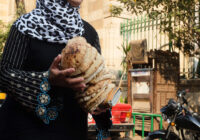Colonial encroachment in North Africa created new opportunities for women to travel and challenge social norms.
During my travels in Morocco, I discovered Emily Keene’s memoir, My Life Story. In the 1870s, Keene traveled to Tangier as a governess for an English family. Soon after, she married the leader of a prominent religious order. As part of the public duties affiliated with this role, she received followers who came to do homage and seek alleviation of various maladies.
Keene contributed to her husband’s healing persona in remarkable ways. She used her own pharmacy and medical knowledge to support new mothers, treat infants and inoculate Moroccans against smallpox. The expansion of colonial power in North Africa shaped her medical activities in Morocco.
Colonial Medicine
In late 19th century Europe, medicine was transitioning from the study of humors to the study of pathogens. This eventually led to the development of vaccines. However, this scientific advancement developed alongside insidious sociological theories that justified European “superiority” over indigenous populations.
There was a view that local medicine should be reformed under European tutelage. French doctors criticized certain practices, such as visiting shrines and consulting popular healers. Ironically, European and Arab regimens for bacterial infections still bore striking resemblances since they were both based on the idea that diseases resulted from humoral imbalances.
Keene encountered and treated disease in this context of medical progress and stagnation. She relied first and foremost on her own knowledge, maintaining a skeptical attitude toward local medical men. When her child fell ill, she rebuffed the remedies of an apothecary. She also showed disdain for a medical attendant, whom she accused of accelerating her husband’s deteriorating health.
Still, her skepticism about local doctors did not necessitate the view that they were primitive minds, no different from “sorcerers” or “fetish-men”—terms that circulated in the vocabularies of French sociologists. While Keene understood herself as a civilizing agent, she was content to operate as a clinical extension of her husband’s role as a religious leader and healer.
Women Travelers
Traveling women strained conventions of femininity in 19th century England. Keene went against the grain of her time by publicizing her personal life in Morocco. Moreover, she redefined notions of femininity by injecting her vaccines and medical advice into Moroccan communities.
Born almost 30 years after Keene, Isabelle Eberhardt also traveled to North Africa in her early 20s. In 1900, she left Geneva for Algeria, where she disguised herself as a young man and joined a Sufi brotherhood.
Despite Eberhardt’s sloughing off of her European identity, she became a close friend of Hubert Lyautey, a French army general and administrator. Moreover, she used her faith (she converted to Islam) in order to curry favor with religious leaders and encourage their compliance with colonial rule.
While Eberhardt was transgressive, she was also complicit in the consolidation of colonial rule in North Africa. Likewise, Keene seemed to accept, if not welcome, the inevitably of European rule herself. Nevertheless, these women jettisoned certain attitudes and behaviors that would have prevented them from becoming steeped in local culture. They are subversive because they “lost caste,” as Larry Rue noted in an article about Keene in the Chicago Tribune near the end of her life.
Women and Colonial Encounter
Both Keene and Eberhardt left behind records of their travels. There are several pitfalls to consider while reading their works. In general, memoir is selective and does not offer the reader a broad historical understanding. Additionally, memoir tends to focus on the impressions and experiences of one person. As a result, it conveys a single reality, highly mediated by gender, power and class. These limitations characterize My Life Story.
For example, the memoir depicts Morocco as a space lacking resistance by leaving out voices that rejected European rule. Likewise, it does not show how Moroccans, and Moroccan women in particular, challenged cultural assumptions of their own society. Given Keene’s frequent movements between religious orders, she could have addressed the phenomenon of itinerant female saints and mystics in North Africa. These omissions leave the reader with misconceptions about local agency.
Despite these shortcomings, My Life Story can help us reimagine colonial encounters and women’s position in the late 19th century. Keene engaged in a wide range of activities that did not conform to gender normative behavior for Victorian women. She traveled alone and developed a public persona through political and medical campaigns. Additionally, the memoir unsettles notions of colonial power. It challenged dominant discourses by depicting the meeting and negotiation of cultures, rather than the imposition of one culture upon another.
The views expressed in this article are the author’s own and do not necessarily reflect Fair Observer’s editorial policy.
Photo Credit: Pavliha
Support Fair Observer
We rely on your support for our independence, diversity and quality.
For more than 10 years, Fair Observer has been free, fair and independent. No billionaire owns us, no advertisers control us. We are a reader-supported nonprofit. Unlike many other publications, we keep our content free for readers regardless of where they live or whether they can afford to pay. We have no paywalls and no ads.
In the post-truth era of fake news, echo chambers and filter bubbles, we publish a plurality of perspectives from around the world. Anyone can publish with us, but everyone goes through a rigorous editorial process. So, you get fact-checked, well-reasoned content instead of noise.
We publish 2,500+ voices from 90+ countries. We also conduct education and training programs
on subjects ranging from digital media and journalism to writing and critical thinking. This
doesn’t come cheap. Servers, editors, trainers and web developers cost
money.
Please consider supporting us on a regular basis as a recurring donor or a
sustaining member.
Will you support FO’s journalism?
We rely on your support for our independence, diversity and quality.






